BigCommerce and Volusion are two leading eCommerce platforms, each offering different strengths, features, and target users. In this BigCommerce vs Volusion comparison, you’ll see how they match up across key areas such as design, features, customer support, and pricing, helping you make the best decision for your business.
BigCommerce vs Volusion – A Quick Verdict
Both BigCommerce and Volusion are well-known eCommerce solution, but they cater to different business needs. While BigCommerce offers robust scalability and advanced selling features, Volusion focuses on a streamlined experience for smaller businesses with a lower learning curve. This is the biggest difference between BigCommerce vs Volusion.
To help you decide, here’s a side-by-side comparison of BigCommerce and Volusion across key criteria.
BigCommerce | Volusion | The Winner | |
Pricing | From $39 to $399/month. Offers enterprise-level pricing tier. | From $35 to $299/month. Provides revenue-based fees on higher plans. | BigCommerce |
Ease of Use | Has a steeper learning curve for beginners. | Offers a simple interface even for beginners. | Volusion |
Design & Templates | Provides 180+ templates with 12 free options. Is highly customizable with HTML & CSS access. | Only comes with 30 pre-built template. Offers limited website customization. | BigCommerce |
Marketing & SEO Features | Strong SEO tools & built-in marketing features. | Decent SEO, but lacks advanced marketing tools. | BigCommerce |
Apps & Integrations | Large app store supporting 1,000+ integrations. | Limited third-party app support. | BigCommerce |
Inventory Management | Multi-location stock management, bulk editing, automation tools. | Basic inventory tracking, lacks automation. | BigCommerce |
Payment Gateways | 65+ payment options. no transaction fees. No transaction fees. | Only supports well-know payment processors. Extra transaction fees. | BigCommerce |
Shipping & Fulfillment | Real-time shipping rates, multi-carrier support, dropshipping integrations. | Limited carrier options, no built-in dropshipping features. | BigCommerce |
Blogging & Content | Built-in blogging platform. | No native blogging feature. | BigCommerce |
Scalability | Supports large enterprises with advanced API access. | Best for small-to-medium businesses. | BigCommerce |
Customer Support | 24/7 phone, chat, and email support. | Phone and chat support only on higher plans. | BigCommerce |
Security | PCI Level 1 compliant, free SSL, fraud protection. | PCI compliant, but SSL is not included on lower plans. | BigCommerce |
Pricing – BigCommerce Offers More Value for Money
➤ The verdict:
When comparing BigCommerce vs Volusion, BigCommerce offers better value for most businesses. It has transparent pricing, no transaction fees, and feature-rich plans that support scalability. Even at the entry-level, BigCommerce includes unlimited products, multi-currency support, and advanced SEO tools, making it a cost-effective choice.
BigCommerce offers various pricing plans for different business sizes. The plans provide essential features for small businesses and advanced capabilities for larger ones.
Here are the pricing options:
- Standard Plan – ideal for new businesses: $39/month. This plan includes unlimited products, file storage, and bandwidth.
- Plus Plan – ideal for businesses looking to grow: $105/month. This plan adds features like abandoned cart recovery and customer groups.
- Pro Plan – ideal for fast-growing businesses: $399/month. This plan supports larger businesses with advanced product filtering and custom SSL.
- Enterprise Plan: Custom pricing. This plan is tailored for businesses needing advanced functionality and personalized support.
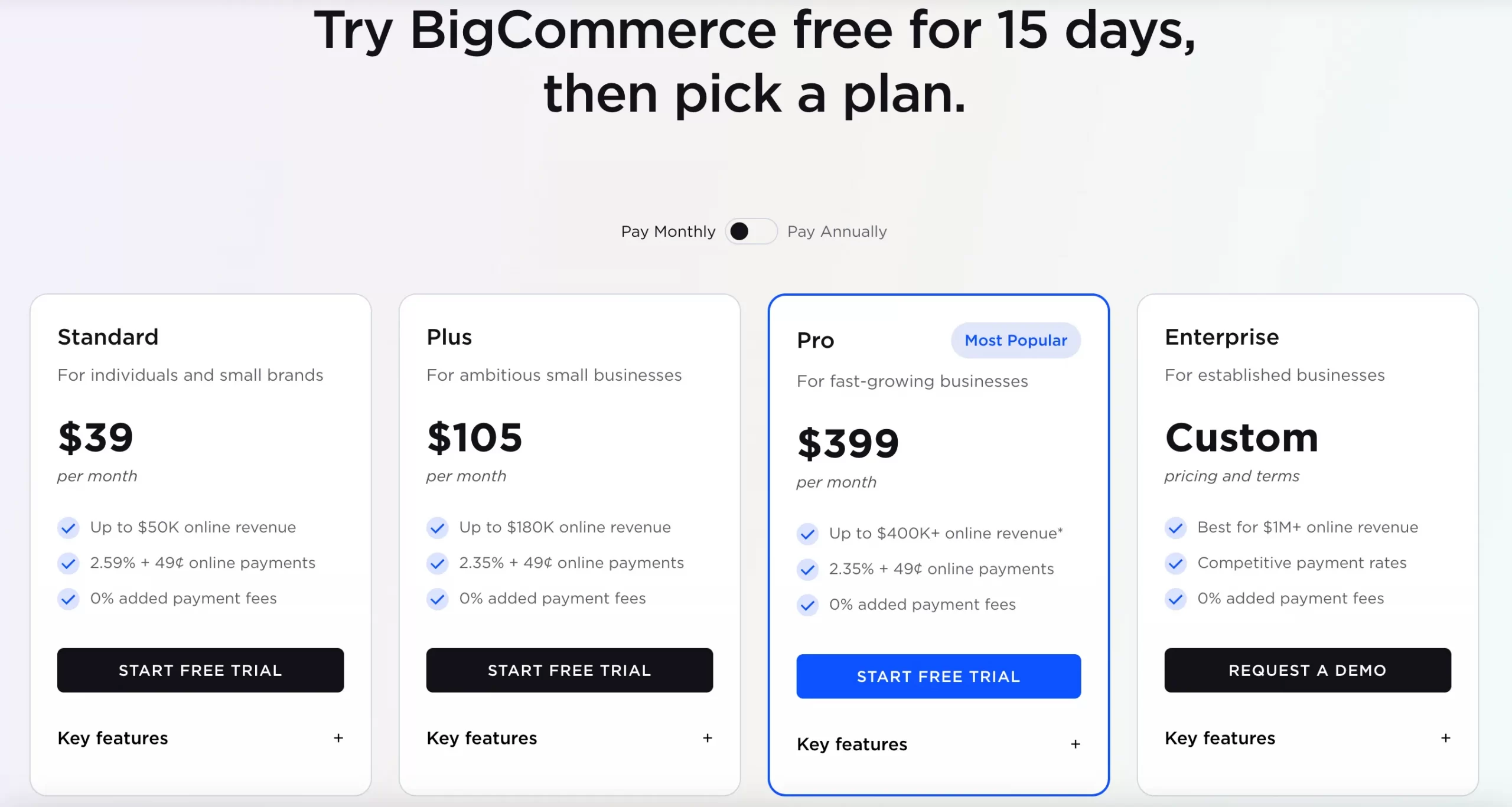
But wait, here is what BigCommerce doesn’t really want to tell you. They have annual revenue limits based on their pricing tiers. Once you exceed those revenue caps (e.g., $50,000 for the Standard plan), you’ll be forced to upgrade to a higher, more expensive plan. This can lead to unexpected cost increases for growing businesses.
One key advantage of BigCommerce is it charges no additional transaction fees. You do not pay extra for the use of leading payment gateways which can lead to significant savings, especially if you have high-volume stores. But while BigCommerce advertises no transaction fees, you should be aware that if you don't use one of their preferred payment gateways (like PayPal powered by Braintree), you may incur additional costs or lose out on certain benefits.
What about Volusion pricing?
Volusion's pricing structure targets small and medium-sized businesses. The plans offer core eCommerce features at competitive rates.
Here are Volusion’s pricing options:
- Personal Plan: $29/month. This plan includes basic features like up to 100 products and online support. It is ideal for small startups.
- Professional Plan: $79/month. This plan adds phone support and allows up to 5,000 products. It is suitable for growing businesses.
- Business Plan: $299/month. This plan includes unlimited products and priority support, designed for larger stores.
- Prime Plan: Custom pricing. This plan caters to businesses with high sales volumes needing personalized solutions.
Similar to BigCommerce, Volusion also has revenue-based tier systems that can lead to unexpected cost increases as you grow. (e.g., $50,000 for the Personal plan).
Though Volusion charges no transaction fees, they do require you to use specific payment gateways, and processing fees through third-party gateways can add up. Also, some gateways may have limitations or delays in accessing funds.
Ease of Use – Volusion is More Beginner-friendly
➤ The verdict:
Between BigCommerce vs Volusion, Volusion is the winner in ease of use. It offers a more beginner-friendly dashboard and a smoother learning experience. However, BigCommerce provides more powerful tools for scaling a business, even if it takes longer to master.
BigCommerce is known for its easy-to-use interface. The dashboard is designed to be clear and easy to navigate. It provides a clear view of store performance, orders, and products.
The platform organizes key features into a simple layout. You can easily add products, manage inventory, process orders, and handle promotions. One of BigCommerce's best features is its drag-and-drop page builder. This tool allows users to create and modify pages without needing coding skills.
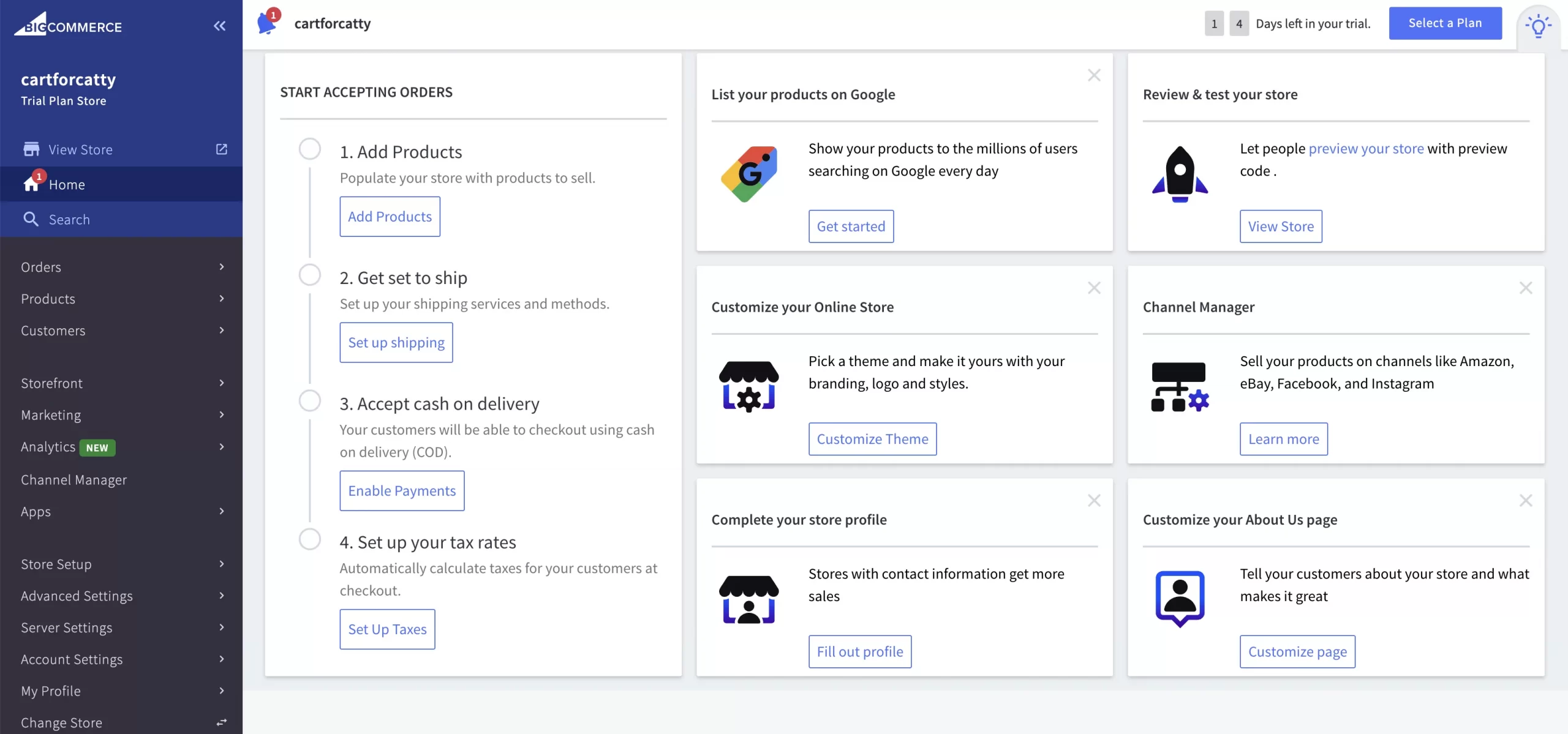
Additionally, BigCommerce has an advanced search function. This helps users find specific settings or features quickly. As a result, less time is spent navigating menus.
Before reviewing Volusion's ease of use, we have to say that the initial steps to create a Volusion store is rather slow. We must wait for more than 15 minutes for the initial setups.
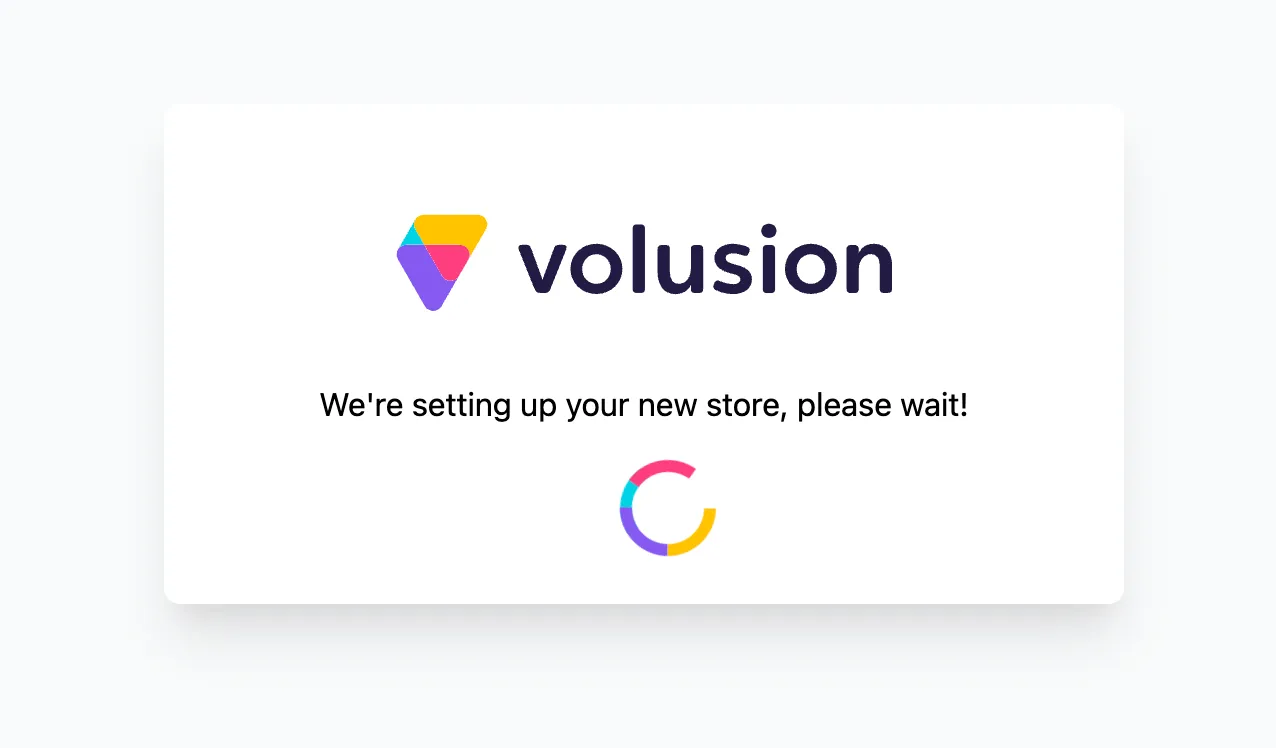
Volusion has improved its editor, but it still falls behind BigCommerce in ease of use. Its dashboard is intuitive for managing products, orders, and inventory. The platform is simple and works well for beginners. However, we feel that the editor is still clunky when it does not offer the smooth experience that BigCommerce provides.
Design and Templates – BigCommerce Offers More Customizability
➤ The verdict:
Between BigCommerce vs Volusion, BigCommerce is the clear winner in design and templates. It offers a wider selection of modern, responsive themes suited for various industries. With 200+ free and paid themes, a drag-and-drop Stencil framework, and full HTML/CSS access, it provides greater customization and flexibility for businesses of all sizes.
BigCommerce offers a rich collection of themes, which is one of its biggest advantages. It provides a wide variety of modern, responsive themes that suit different industries. Whether you run a fashion store, electronics shop, or B2B wholesale site, there are options for you.
In our opinion, BigCommerce themes are not only visually appealing but also customizable. You can easily adjust layouts, colors, and fonts to match your brand. BigCommerce offers 200+ free and paid themes. This gives businesses plenty of options to create a unique storefront without needing technical skills.
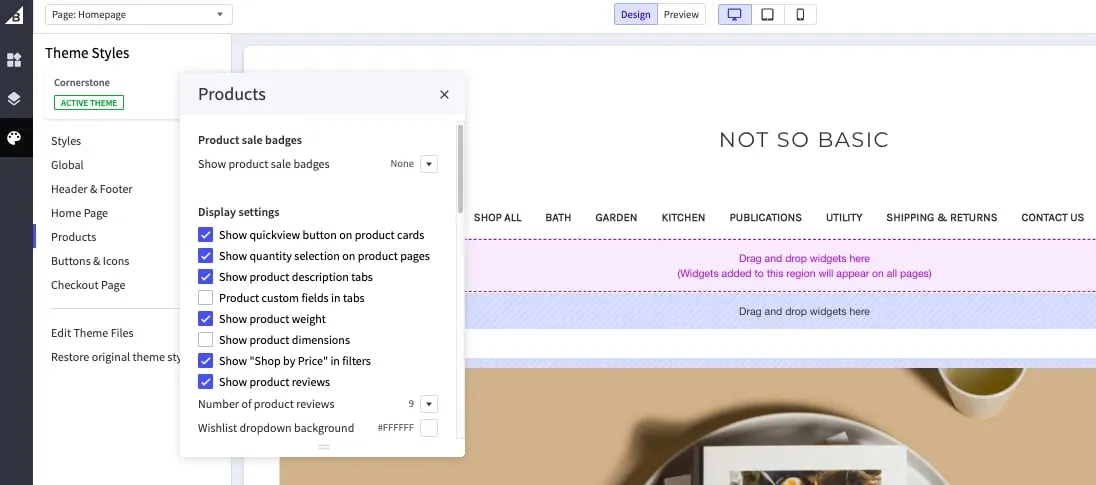
BigCommerce also includes a Stencil theme framework for drag-and-drop editing, making design changes simple. For advanced users, the platform allows full access to HTML and CSS.
Volusion, on the other hand, offers fewer design options of 20+ free and fully customizable themes for each business's unique preferences. Volusion’s themes tend to be simpler, which may work well for small businesses but can limit larger stores needing advanced customization. As you can see, the choices are not as varied or modern as BigCommerce.

Volusion offers some customization within its themes, but not as much as BigCommerce. Users can change basic elements like logos, fonts, and colors. However, those needing more extensive design changes may need help from external developers or rely on custom code edits.
Marketing and SEO Features – BigCommerce Takes The Lead
Marketing tools
➤ The verdict:
When comparing BigCommerce vs Volusion in terms of marketing tools, BigCommerce is definitely the stronger choice. It provides built-in email marketing, abandoned cart recovery, and multi-channel selling across platforms like Facebook, Instagram, and Amazon. Its powerful promotions engine and API flexibility make it easier to create and manage marketing campaigns without relying on third-party apps.
For businesses looking to grow through digital marketing, BigCommerce offers all the essential tools without needing third-party apps. It includes built-in email marketing, abandoned cart recovery, and customer segmentation.

A key feature is its ability to manage multiple sales channels like Facebook, Instagram, Amazon, and more from one dashboard. The promotions engine allows users to create discounts, special offers, and coupons easily. BigCommerce’s flexible API integrations also support connecting with other popular marketing tools, expanding marketing options even further.
Volusion, while more limited, still offers some useful marketing tools. You can create discount codes and integrate with basic email marketing platforms. Volusion also has CRM tools to manage customer relationships. However, Volusion does not support multi-channel selling as well as BigCommerce. Larger stores may need third-party apps for more advanced marketing needs.
SEO optimization
➤ The verdict:
In terms of SEO optimization between BigCommerce vs Volusion, BigCommerce is the clear winner. It provides strong built-in SEO tools, including custom URLs, meta tags, canonical tags, and SEO-friendly sitemaps. It also helps improve page loading speeds, a crucial ranking factor for search engines.
BigCommerce has strong SEO features. You can easily optimize product pages, URLs, meta descriptions, and titles. BigCommerce supports custom URLs, canonical tags, and SEO-friendly sitemaps. It also includes tools to improve page loading speeds, a key factor for search engine rankings.

While BigCommerce provides strong SEO tools, sellers often face challenges with URL structure customization. For example, the platform automatically adds a /products slug in URLs, which can limit SEO flexibility for larger, complex stores.
Volusion also offers SEO tools, but they are less advanced than BigCommerce's. You can customize meta tags, titles, and URLs. Actually, Volusion has a reputation for outdated SEO practices. Its URL structure isn’t as customizable, and their site performance (e.g., page speed) has historically been lower compared to other platforms, negatively affecting SEO rankings.
Third-party Apps – BigCommerce Offers More Integrations
➤ The verdict:
Between BigCommerce vs Volusion, BigCommerce is the better choice for third-party apps and integrations. It provides a large app store with hundreds of integrations, covering marketing, sales, shipping, inventory management, and accounting. Its API-driven approach allows businesses to seamlessly connect custom-built solutions, making it ideal for stores that need advanced functionality and flexibility.
BigCommerce offers a wide range of apps and integrations. The selection of BigCommerce apps includes hundreds of apps in various categories (marketing, sales, shipping, inventory management, and accounting).
BigCommerce uses an API-driven platform to ensure seamless integration with third-party services. It's especially helpful for businesses with specific needs that require custom-built solutions.
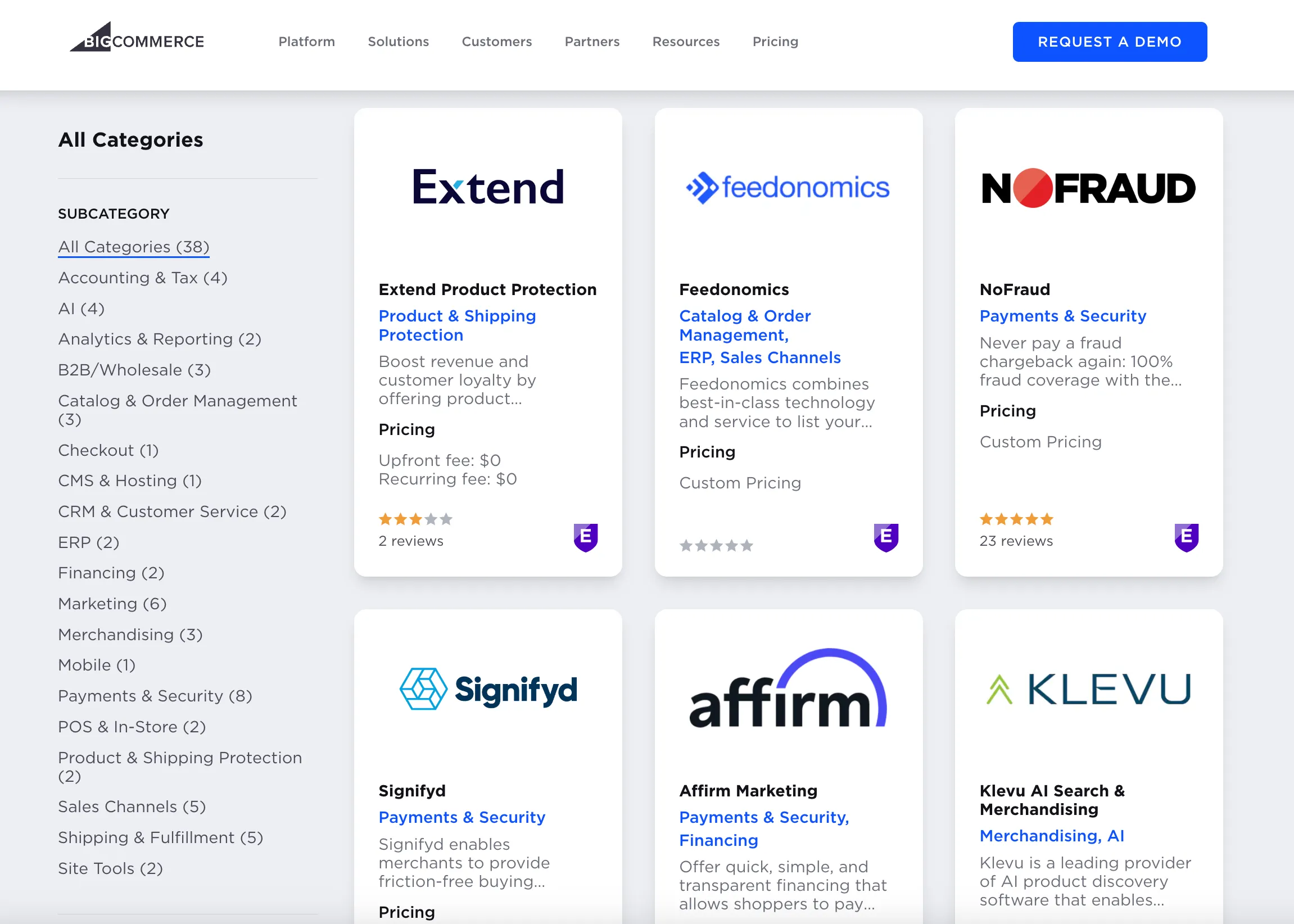
Here are some popular BigCommerce integrations we recommend to you:
- Marketing: MailChimp, HubSpot, Klaviyo.
- Shipping & Fulfillment: ShipStation, ShipperHQ, FedEx.
- Accounting: QuickBooks, Xero.
- Social Media: Facebook, Instagram, Pinterest.
Volusion takes a different approach from BigCommerce. It offers fewer third-party integrations and focuses on built-in tools. This can benefit small businesses that prefer a simple setup. It reduces the need to navigate multiple app stores or set up external services.
Volusion includes many features within its core platform. These include CRM tools, email marketing, and inventory management. This eliminates the need for some third-party apps. However, these built-in tools lack the depth that larger businesses might need. For example, Volusion's email marketing works, but it lacks the advanced features of apps like MailChimp.
Still, Volusion does support some popular integrations, including:
- Payment Processing: Stripe, PayPal.
- Shipping Solutions: FedEx, UPS, Shippo.
- Analytics and Reporting: Google Analytics.
Ecommerce Capabilities – BigCommerce Provides More Advanced Tools
Product and inventory management
➤ The verdict:
Between BigCommerce vs Volusion, BigCommerce is the stronger choice for product and inventory management. It provides multi-location inventory tracking, bulk editing, and automation tools that help businesses manage large catalogs efficiently.
Effective product and inventory management ensures smooth operations and prevents stock issues. In this section, we compare BigCommerce vs Volusion to determine which platform offers better tools for managing inventory, tracking stock, and handling product variations.
BigCommerce provides powerful inventory management tools designed for growing businesses. It supports multi-location inventory tracking, allowing merchants to manage stock across different warehouses. You can also enable low-stock alerts and automate inventory updates to avoid overselling.
The platform includes bulk product editing, making it easy to update prices, stock levels, and product descriptions in one step. BigCommerce also integrates with third-party inventory apps, offering more flexibility for businesses with complex supply chains.
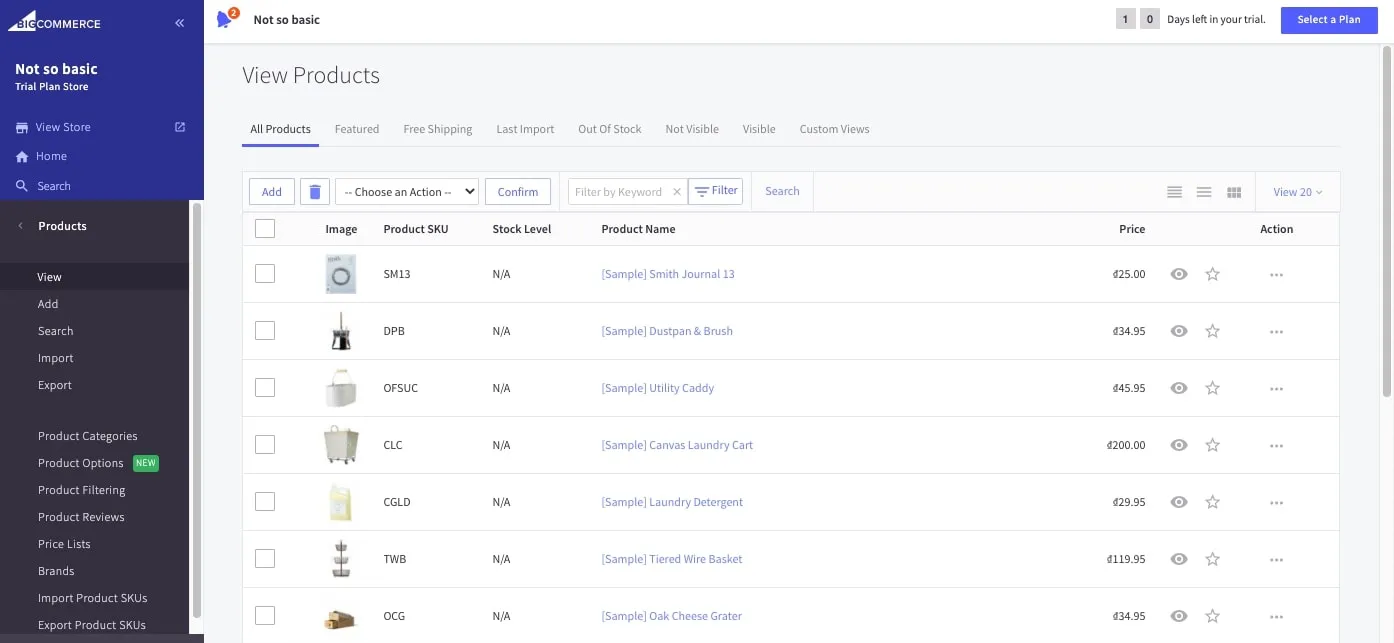
Meanwhile, Volusion offers basic inventory management but lacks advanced automation. It provides real-time stock tracking, helping merchants monitor inventory levels. However, it does not support multi-warehouse management, which can limit scalability for businesses with multiple fulfillment locations.
Payment gateways and processing
➤ The verdict:
When comparing BigCommerce vs Volusion, BigCommerce is the better choice for payment gateways and processing. It supports more payment providers, does not charge transaction fees, and offers advanced features like BNPL and multi-currency support.
BigCommerce supports more than 65 payment gateways serving 100+ countries and over 250 local payment methods. These include major providers like PayPal, Stripe, Square, and Authorize.Net. BigCommerce also supports multiple currencies, making it ideal for businesses with international customers. The platform allows businesses to offer various payment methods, such as credit cards, digital wallets like Apple Pay, and even cryptocurrency.
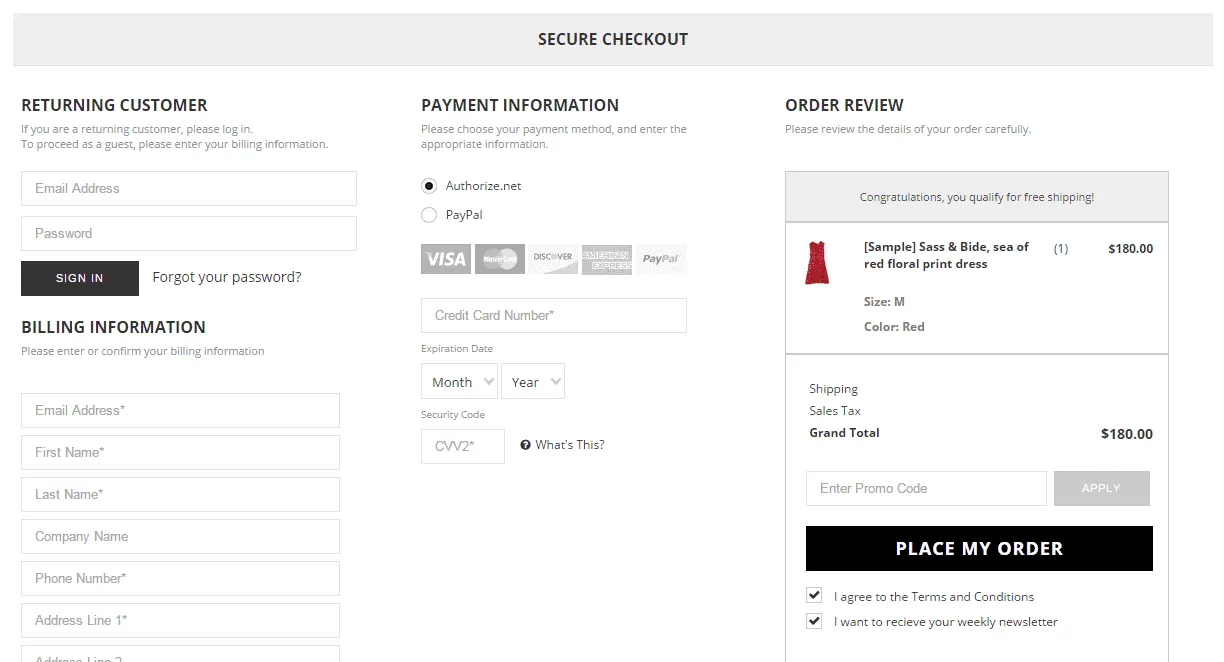
Another advantage of BigCommerce is that there is no additional transaction fees. Unlike some other platforms, BigCommerce does not charge extra for using pre-integrated payment getaways. This makes it a cost-effective option for businesses wanting to offer a wide variety of payment options.
Volusion supports fewer payment gateways compared to BigCommerce. It just integrates with popular gateways like PayPal, NMI, and Authorize.Net. For that reason, businesses that need more options or international payment processing may find Volusion’s choices limited.
Though Volusion does not charge transaction fees if you use Volusion Payments Powered by Stripe, its payment processing features are more basic. This may be enough for smaller businesses with simple payment needs.
Shipping and fulfillment
➤ The verdict:
Between BigCommerce vs Volusion, BigCommerce is the better choice for shipping and fulfillment. It provides more carrier options, better automation, and built-in dropshipping support.
Shipping and fulfillment play a crucial role in eCommerce success. The right platform should offer flexible shipping options, real-time rate calculations, and integrations with major carriers. In this section, we compare BigCommerce vs Volusion to see which provides better shipping and fulfillment features.
BigCommerce offers a wide range of shipping options. It supports real-time shipping rates from carriers like UPS, FedEx, and USPS. You can set custom shipping rules, offer free shipping, and integrate with fulfillment services like ShipStation and Amazon FBA.
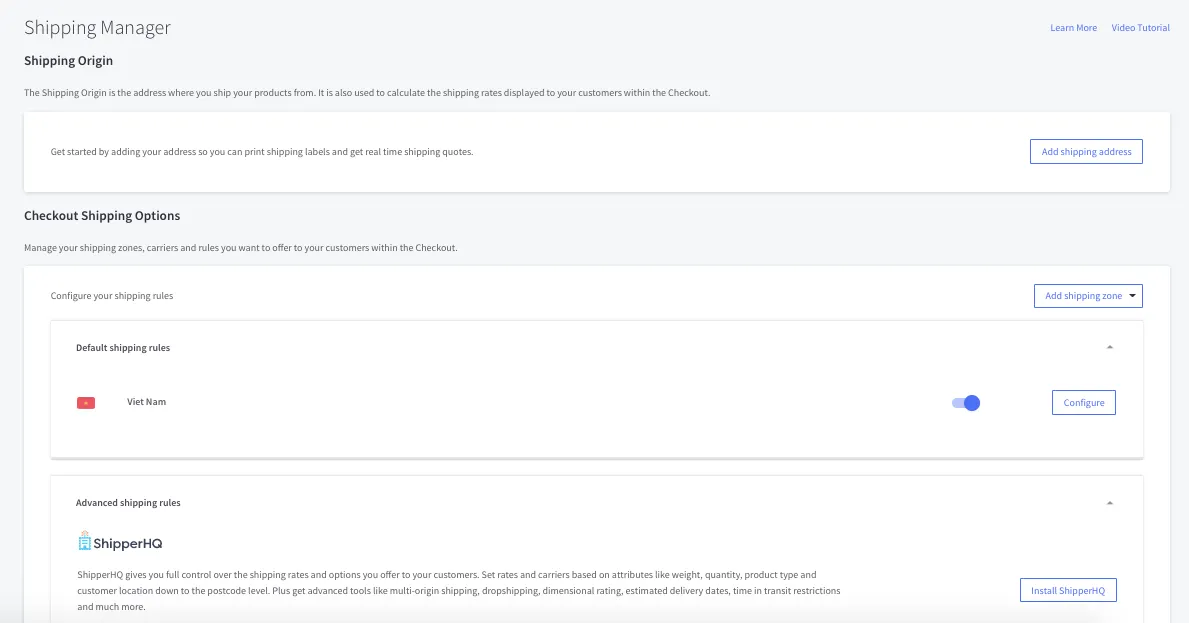
This platform also supports dropshipping. You can connect apps like Printful and AliExpress Dropshipping to automate order fulfillment. Multi-location shipping is another key feature, allowing you to ship from multiple warehouses for faster delivery.
For more information, please don't forget to check out our detailed handbook on BigCommerce shipping.
On the other hand, Volusion provides basic shipping features but lacks advanced automation. It supports real-time shipping rates, but carrier integration is more limited. Unlike BigCommerce, it does not have built-in dropshipping support. You need third-party apps to enable this feature.
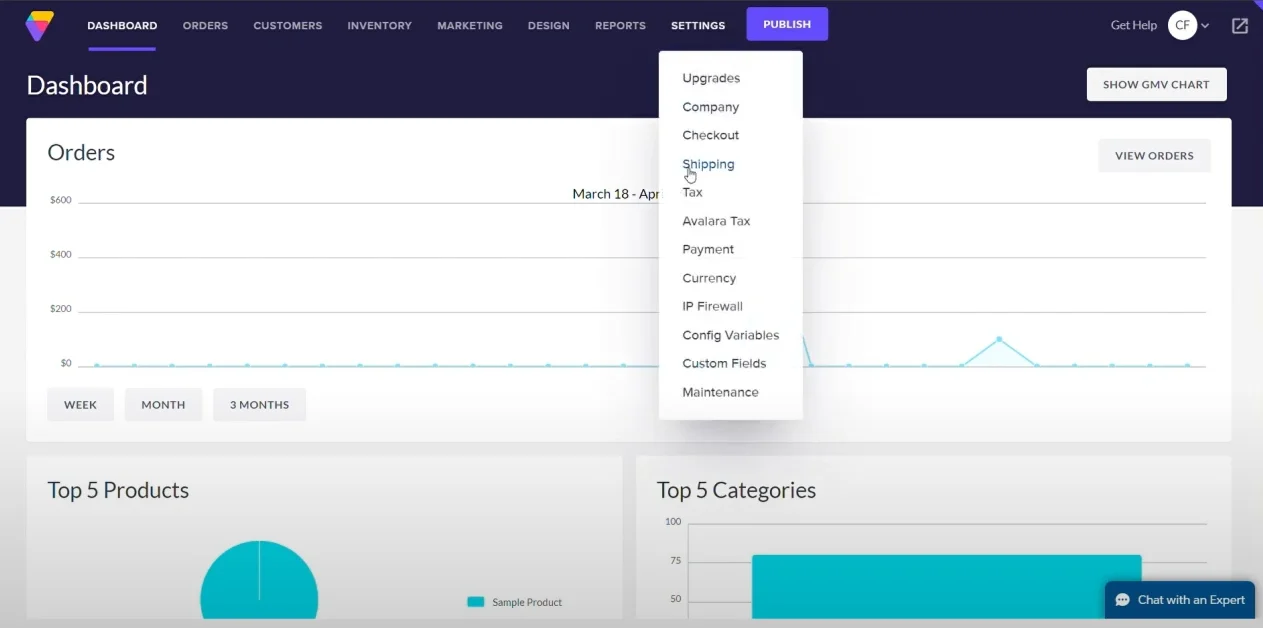
Fulfillment flexibility is also lower. Volusion does not offer multi-location shipping, which can be a drawback for growing businesses. If you need more shipping automation, you may find Volusion less efficient compared to BigCommerce.
Blogging – BigCommerce Is Better For Content Marketing
➤ The verdict:
When comparing BigCommerce vs Volusion, BigCommerce stands out as the better choice for blogging and content management. Its built-in blogging feature, SEO-friendly tools, and seamless integration allow businesses to easily manage both content and eCommerce from a single platform.
Regular blogging is one effective way to engage an audience. It also supports a brand's SEO efforts. BigCommerce understands this need. Therefore, it offers built-in blogging features. These features allow store owners to create, manage, and publish blog posts directly from their dashboard.
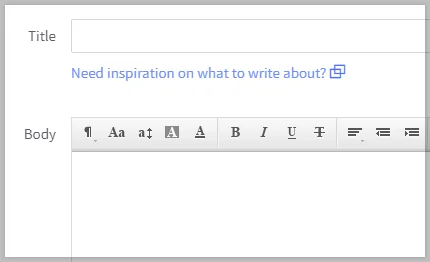
BigCommerce’s blogging tool includes essential features for content creation:
- Users can optimize blog posts for search engines. They can customize meta descriptions, URLs, and tags.
- Users can schedule posts in advance.
The native blogging feature allows BigCommerce users to keep customers informed. They can share updates, promote products, and improve search engine rankings from a single platform. This built-in capability is especially beneficial for businesses looking to enhance their SEO and content marketing strategies without relying on third-party platforms.
In contrast, Volusion does not offer a built-in blogging feature. This is a significant drawback for businesses that want to use content marketing. While Volusion supports basic eCommerce functionality, users who want a blog must use third-party solutions. They may need to integrate WordPress or another external content management system (CMS).
This added step creates friction for users. It requires extra effort to manage a blog separately from the core eCommerce platform. Additionally, users miss out on the seamless integration that BigCommerce offers. In BigCommerce, blog posts and products can be managed from the same dashboard.
Scalability – BigCommerce Has More Growth Potential
➤ The verdict:
When it comes to BigCommerce vs Volusion in scalability, BigCommerce is the superior choice. It supports large product catalogs, high traffic volumes, and multi-channel selling, making it ideal for medium-to-large businesses planning for growth. Features like unlimited products, open API architecture, and automation tools provide flexibility as businesses expand.
BigCommerce stands out for its scalability. This feature makes it ideal for businesses that plan to grow. The platform can handle large catalogs, heavy traffic, and high transaction volumes. As a result, it appeals to medium-to-large businesses expecting significant sales growth.
Key scalability features of BigCommerce include:
- All pricing plans allow unlimited products and bandwidth.
- BigCommerce integrates with multiple sales channels like Amazon, eBay, Facebook, and Instagram.
- The platform supports automated workflows for product management and marketing campaigns.
- BigCommerce’s Enterprise plan offers dedicated account management and advanced security features.

Additionally, BigCommerce uses an open API architecture. This design allows developers to create custom solutions that integrate easily with the platform to help businesses adapt as they grow.
What’s more, BigCommerce supports over 140 currencies, making it easier for businesses to sell internationally and cater to diverse customer bases.
In contrast, Volusion is a solid platform for small to mid-sized businesses. It offers features suitable for smaller product catalogs and moderate traffic. For smaller operations, Volusion provides tools to manage inventory and process payments effectively.
Yet, you may struggle with the demands of large enterprises or fast-growing businesses on Volusion. Its limited app marketplace and less advanced API options mean that businesses with unique needs may find Volusion restrictive. Moreover, Volusion does not support merchants outside the U.S., significantly limiting its scalability for international sales.
Customer Support – BigCommerce Offers More Support Overall
➤ The verdict:
When comparing BigCommerce vs Volusion, BigCommerce provides a more comprehensive and accessible customer support system. It offers 24/7 live chat and phone support on all plans, along with email assistance, a knowledge base, and a community forum.
BigCommerce excels in providing a wide range of customer support options. This ensures that businesses can get help for any issue.
One key advantage is its multi-channel support, which includes:
- 24/7 live chat and phone support.
- Email support.
- Help Center and Knowledge Base.
- Community forum.
- Dedicated Account Managers (Enterprise Plan).
Additionally, BigCommerce’s onboarding process includes detailed tutorials. These are especially helpful for new users. The platform also provides educational resources like webinars and blogs. These resources empower users to maximize their store's potential.
Volusion also offers customer support, but it is somewhat limited compared to BigCommerce. Volusion provides several support channels, but access depends on the pricing plan.
Support options include:
- 24/7 live chat and phone support.
- Email support.
- Help Center and Knowledge Base.
- Community forum.
- Priority support (Business and Prime Plans).
However, Volusion’s community resources are less robust than those of BigCommerce. The platform lacks an active forum or broad educational initiatives like webinars. This can limit businesses looking to quickly scale or address complex issues.
Security – BigCommerce Is More Secured
➤ The verdict:
Between BigCommerce vs Volusion in terms of security, BigCommerce offers a stronger and more reliable security framework. It provides PCI DSS Level 1 certification, SSL certificates, DDoS protection, automated backups, and two-factor authentication (2FA). Additionally, its cloud hosting infrastructure ensures 99.99% uptime, keeping stores secure and running smoothly, even during high-traffic periods.
Security is critical for any eCommerce platform. Both businesses and customers need to know their data is safe. BigCommerce takes security seriously. It offers many features to keep stores and customers secure.
Key security features of BigCommerce include:
- PCI DSS Level 1 certified.
- SSL Certificates.
- Distributed Denial of Service (DDoS) attack protection.
- Automated backups.
- Two-factor authentication (2FA).
BigCommerce also focuses on performance. Its cloud hosting infrastructure provides fast and reliable service during high traffic periods. With a 99.99% uptime guarantee, BigCommerce ensures stores run smoothly and securely.
Volusion has faced challenges with security, especially after a data breach in 2019. This breach affected thousands of stores and damaged its reputation. Since then, Volusion has taken steps to improve its security infrastructure.
In response to the breach, Volusion introduced several improvements:
- PCI DSS Level 1 certified.
- SSL Certificates.
- Distributed Denial of Service (DDoS) attack protection.
- Data encryption.
After the 2019 breach, Volusion enhanced its security infrastructure. It focused on closing vulnerabilities and improving system monitoring. While Volusion has made improvements, its history may concern some users.
BigCommerce vs Volusion: Which Is Right for You?
Best for small businesses and startups:
Volusion is ideal for small businesses and startups due to its user-friendly interface and affordability. It offers essential features like CRM and email marketing without overwhelming users.
Best for medium to large enterprises:
BigCommerce is better for medium to large enterprises or fast-growing companies. It supports large product catalogs, multi-channel selling, and heavy traffic. With features like unlimited bandwidth, advanced SEO, and marketing automation, BigCommerce is designed for businesses that need scalability and advanced functionality.
Best for niche businesses:
Niche businesses can use either platform based on their size and needs. BigCommerce, with its customization and marketing tools, is a better fit for larger, more complex niche businesses.
BigCommerce vs Volusion – FAQs
What is the disadvantage of BigCommerce?
One of BigCommerce’s main drawbacks is its learning curve. While it offers powerful features, beginners may find the platform complex compared to simpler alternatives. Additionally, customizing URL structures can be restrictive, as BigCommerce automatically adds certain slugs, which may affect SEO flexibility.
What is Volusion used for?
Volusion is an eCommerce platform designed for small to mid-sized businesses. It provides tools for building an online store, managing inventory, processing payments, and tracking customer relationships. Volusion is best for businesses that want a simple, all-in-one solution without extensive third-party integrations.
Is BigCommerce the same as Volusion?
No, BigCommerce and Volusion are different eCommerce platforms. While both allow users to create and manage online stores, BigCommerce is more scalable and offers advanced features like multi-channel selling, better SEO tools, and a larger app marketplace. Meanwhile, Volusion focuses on ease of use and built-in tools, making it a better fit for smaller businesses with simpler needs.
Who is BigCommerce best for?
BigCommerce is best for growing businesses and larger enterprises that need scalability, flexibility, and advanced eCommerce tools. It’s ideal for businesses looking to expand across multiple sales channels, manage large product catalogs, and take advantage of robust SEO and marketing features.
Final Verdict
After evaluating the features, performance, pricing, and scalability of both platforms, it is clear that each serves a different purpose. The choice depends on the size and goals of your business.
For small businesses, Volusion vs BigCommerce shows Volusion as the more affordable and user-friendly choice, especially for those seeking eCommerce platform recommendation without needing advanced features. However, for medium to large enterprises or fast-growing businesses requiring scalability, multi-channel selling, and robust marketing tools, BigCommerce is the clear winner.
We hope you did enjoy reading this comparison between BigCommerce vs Volusion and found the right choice for your business. For further eCommerce insights, kindly visit our eCommerce platform section.

